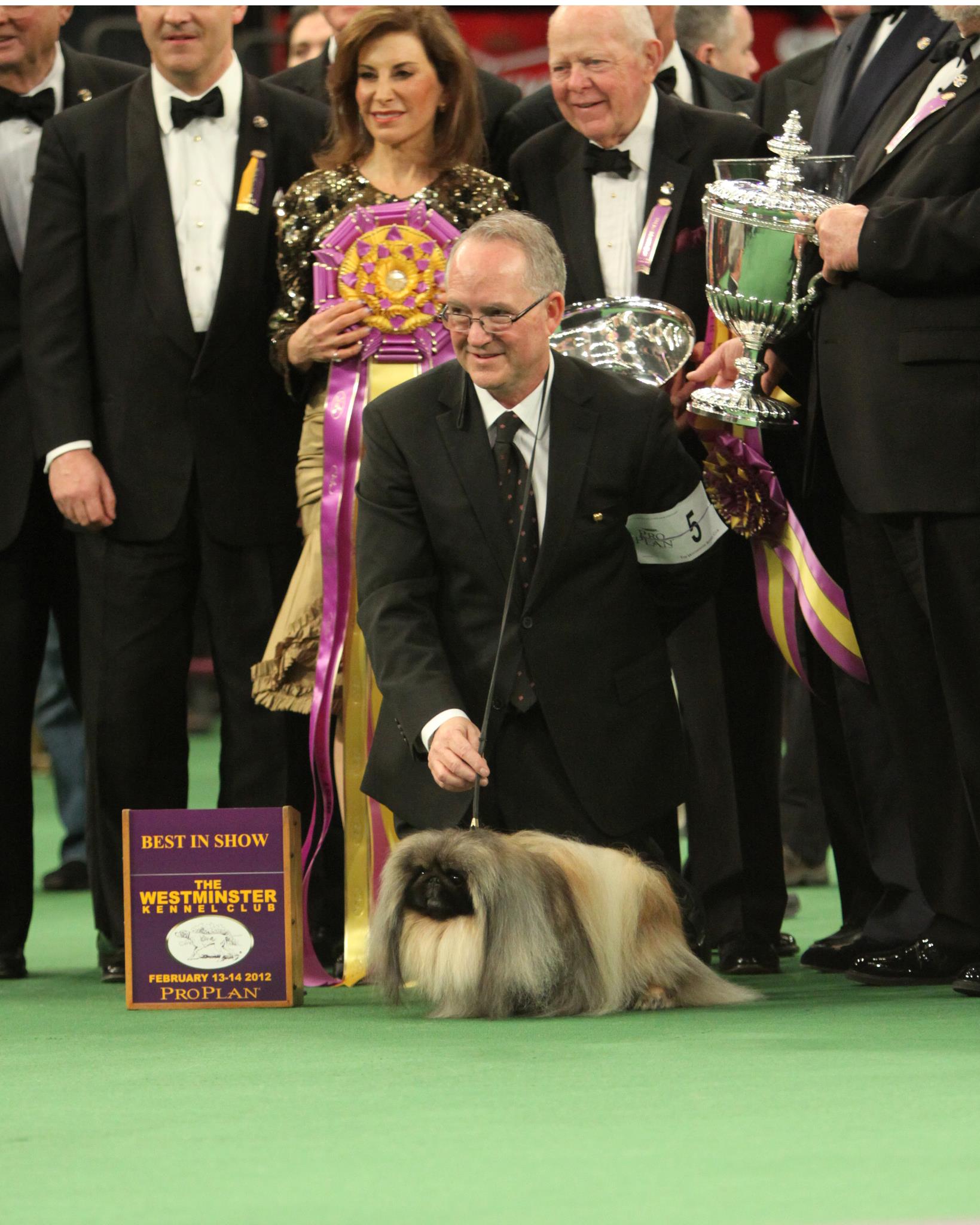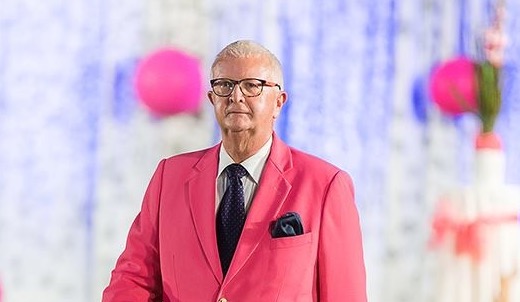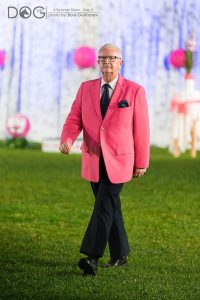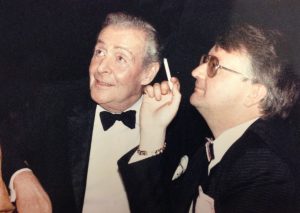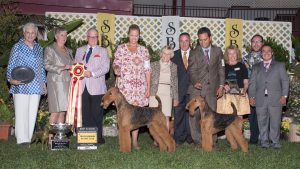270 – David Fitzpatrick on Pekingese, the Palace Dogs of Peking
David Fitzpatrick on Pekingese, the Palace Dogs of Peking
David Fitzpatrick, 2012 Westminster Kennel Club BIS winner with the Pekingese, Malachy, was obsessed with dogs as a child. Although his parents wouldn’t let him own a dog, he found ways to be involved with them by walking and housesitting dogs in the neighborhood.

David Fitzpatrick receiving the Westminster Kennel Club BIS ribbon from judge Cindy Vogels.
His passion took off around 1970 when he wrote a letter to a local handler to see if she needed help. Before he knew it, he was being picked up after school, earning $5/day helping her with Pekingese and other toy breeds.
“It could have been pretty much any breed,” Fitzpatrick said. “I fell into the lap of the Pekingese and loved them from the start. It was fate really.”
“Speak to anyone who is remotely involved with the Pekingese breed and the mention of David Fitzpatrick’s name will result in a degree of awe and reverence, for this American gentleman is acknowledged as being as fine a handler and presenter of a Pekingese as has ever been seen,” says noted British author Andrew Brace.
What is it about Pekingese?
The dogs of royalty in China, the first Pekingese specialty show was held in the US around 1908, Fitzpatrick said. “The breed attracted the pillars of society. They were the status symbol dog of the day and were the most popular toy breed into the ‘60s.”
“It is a detail oriented breed,” Fitzpatrick noted, “with their pear shaped body, rectangular head, features spread out and not crowded, heavy bone, crooked legs, level back and high tail set.”
Pekingese should have an intelligent expression, one that is almost arrogant and disdainful.
“Their true temperament is snooty,” Fitzpatrick said. “They were developed as palace dogs in China. They were royalty and had their own servants. They are generally waiting for you to do for them. It’s not a breed that really wants to please their humans.”
Pekes as pets
Fitzpatrick said the breed is great to live with. “They blend into the household,” he noted. “They get their loves and then go entertain themselves. They’re not constantly clawing at you like some dogs. They’re more independent.”
Pekingese have a great deal of personality, Fitzpatrick added. While they are at a show they are performing, showing their regal and aristocratic nature. At home, they’re like any other dogs, they chase squirrels and his dogs even dug out a nest of baby bunnies.
Breed specific presentation
“It’s up to us to show our dogs in a proper manner, not succumb to this crazy show biz of dogs chasing bait around the ring… an aristocratic breed really should not be begging for food, should they?”
194 — Andrew Brace “Totally Obsessed with Dogs”
“Totally Obsessed with Dogs” and Finding Quality
Born to a long tradition of dogmen from Wales, Andrew Brace acquired his first Boxer in 1963 and began judging in the UK while still a young man. A strong voice in the international purebred dog community today, Brace is a long-time breeder, Best in Show judge and author.
Andrew Brace about to judge the European Semi-Final of the Eukanuba World Challenge at the Split Summer Night Shows in Croatia
“I was totally obsessed with dogs ever since I can remember,” Brace said.
As a child he was immersed in the purebred dog scene, stewarding, traveling, reading dog books and joining dog clubs. One of his favorite early memories, after learning his beloved Bruce the Boxer was monorchid and couldn’t be shown, is being given the job of “Honorary Veterinary Steward” — holding the towel for the veterinarian who was checking dogs in for the ring.
Match shows create community
The UK today, Brace said, has 27 all-breeds championship shows, with only five have championship points available for every recognized breed. Many more matches and open shows, where championship points are not awarded, are available. Brace noted that these shows offer a “social exercise” for the exhibitors where they can enjoy a day out and meet up with their friends.
Mentors offer a step up
Andrew Brace with his “idol and mentor”,
Nigel Aubrey Jones, pictured at the dinner
that followed one the Kennel Review
Tournaments of Champions, held at the
Pontchartrain Hotel in Detroit.
“If people are honest,” Brace said, “they all will admit they had help, from their elders and betters. People who gave them a step up. I’m very conscious to try and help young people I see who have a spart, as other people helped me.”
Brace counts fellow Welshman and famed Pekingese breeder Nigel Aubrey Jones as the guiding influence in his life.
“Nigel was a genius. He was my idol and my mentor,” Brace said. “I learned so much from him. He was my biggest critic and greatest supporter. He and Bill Taylor were remarkable gentlemen. Their quest for perfection in breeding Pekingese changed the breed worldwide. To be honest there isn’t a day goes by I don’t miss Nigel.”
An eye for a dog
Things were not very scientific in becoming a judge, Brace noted. “It was very much about being identified as having an eye for a dog and then refining it through careful study and experience,” Brace said.
The UK had many large kennels in those days, Brace added. “I would ask breeders if I could visit to learn about breed. People were always welcoming and keen to share their knowledge, being ruthlessly honest about (the dogs’) faults and virtues.”
“Quality is the difference between pottery and porcelain”
“Nigel drummed in to me the need to have quality in the dogs we reward,” Brace said. “You won’t find the word quality in any breed standard, but it is the one vital ingredient that we all need in our top winning dogs.”
Brace’s judging advice:
- Always look at the overall picture when assessing a dog, rather than dissecting and evaluating individual details.
- The secret is to find virtues.
- Always stand back from a lineup of dogs and study silhouettes.
Join us next week when Mr. Brace shares his knowledge on successful dog breeding.

